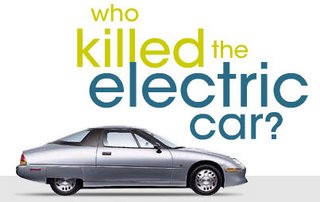 This documentary/film created a lot of buzz when it was released back in June. Badly wanted to see it then but couldn't find a theatre that screened it. Now that the DVD is out, I didn't waste any time. I would summarize the movie in two words....."Must See"
This documentary/film created a lot of buzz when it was released back in June. Badly wanted to see it then but couldn't find a theatre that screened it. Now that the DVD is out, I didn't waste any time. I would summarize the movie in two words....."Must See"The documentary goes about the question, "Who killed the electric car?" in the same manner a mystery novel would go about a murder. Starts off with a funeral scene. Ends with the guilty being revealed. It came as no surprise to find Oil industry, Bush and the American Auto makers(GM in particular) guilty. What came as a surprise were California Air Resources Board and Japanese Auto makers. The documentary details the part Toyota & Honda played in demise of the electric car. I had a good opinion of Toyota. Not sure I have it any more.
The documentary asserts the fact that electric car is a viable technology of today, unlike the pie in the sky Hydrogen counterpart. I am convinced that the Hydrogen hype is created in large part by the Oil industry to create a status quo that gives them the excuse to milk oil till its very last drop. I have written about Joseph Romm's book on Hydrogen before. He is in his best element in this documentary when he deflates Hydrogen hype.
I felt the documentary was a little weak on explaining the core concept of reduction in green house gases by switching to an electric car. I am sure everyone(like me) has the same exact question.
Don't electric cars create as much pollution as gas cars because electricity comes from coal plant ?A partly convincing answer (from WhoKilledTheElectricCar.com )
The "“long tailpipe"” theory argues that electric vehicles do not reallyThe documentary ends however on a very positive and optimistic note. The successes of recently launched Tesla and promise of Plug-in Hybrids are very good reasons to be hopeful. This film along with An Inconvenient Truth, are essential elements in the debate and struggle for a sustainable tomorrow.
create zero emissions, because the electricity needed to charge the batteries is produced in power plants. In June 2001, the Argonne National Laboratory released a US Department of Energy-sponsored study that found that battery-powered electric vehicles result in a 35% reduction in greenhouse gases. [25] This reduction was based upon electricity generation from the national grid, roughly half of which is derived from coal and roughly 30% of which is derived from clean, renewable sources like nuclear, solar, wind, biomass and hydroelectric power. [26] In 2004, an analysis of data from a California Air Resources Board staff report on greenhouse gas emissions from motor vehicles found that electric vehicles resulted in a 67% reduction in overall greenhouse gases in California, compared to a car powered exclusively by gasoline, and were nearly twice as effective in reducing greenhouse gas emissions than a hydrogen fuel-cell vehicle. [27] California'’s energy grid is considerably cleaner than the national grid, with roughly 20% of the states electricity being generated via coal-fired plants. [28]
Finally, some energy experts and utility analysts contend that millions of plug-in hybrid electric vehicles could be added to CaliforniaÂ’s fleet without substantially impacting the stateÂ’s current energy grid, since most of the charging for the plug-in hybrid electric vehicles could be done during off-peak hours, at night. [29] . It's estimated that 5,000 plug-in hybrids charging at night would represent less than 0.1 % of peak electrical demand in the state. [30] Moreover, they would also have strong beneficial environmental impact, since a plug-in hybrid vehicle that gets its energy from the grid during off-peak hours is thought to produce one-third the carbon dioxide emissions of an exclusively gas-powered car with a fuel efficiency of 24 mpg. [31] Tim Lippman of UC BerkeleyÂ’s Institute of Transportation Studies also points out that not only is our state and national grid becoming cleaner with increased use of renewable energy sources, but also that it is much easier to control emissions from a relatively small number of power plants than millions of tailpipes, each being a point of emissions and harmful, respiratory pollutants. Lippman also notes that emissions modeling research shows that when it comes to the concentration of harmful pollutants emitted from burning fossil fuels, height matters; the closer to the ground the emissions are, the more they tend to concentrate, making emissions from tailpipes at ground-level potentially more damaging than those from a coal-fired plant'’s smokestack, which may be 200 ft. or more of the ground.

2 comments:
Yes, I agree! Hydrogen is hype, pure and simple (otherwise, why would Bush be so behind it -- it would be so out of character for him to take any position the oil industry opposed).
I saw this movie in the theatre and was also impressed.
I forget though, what was the finger pointed at the japanese auto makers? All I recall is that, because the ARB seemed to be making regulations tight, they began the hybrid work to beat the competition... but how did that affect the electric car (besides just giving us an excuse today to keep burning gas and think that we're not because it's "hybrid")?
-chris
Toyota was very much part of the bizarre confiscating and destroying electric car ritual. Perfectly good and working electric cars were forcefully taken from hapless owners to be destroyed and shredded.
Post a Comment